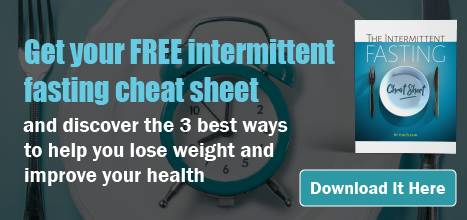Intermittent fasting has been making the news as being a safe and effective method for losing weight and building health, but there is a lot of conflicting and even misleading information out there on the topic. Here is an overview of the top things you want to know if you’re looking into intermittent fasting for yourself or someone you care about.
What is Intermittent Fasting?
Fasting is the ancient practice of abstaining from food for a period of time for health, personal growth, or spiritual benefit. Intermittent fasting means fasting for a limited period of time on a repeated schedule.
Unlike fasts that go on for an extended period, intermittent fasting is safe and accessible to nearly everyone. While there are many good reasons to practice fasting, it is only relatively recently that science has discovered the mechanisms by which intermittent fasting creates the physiological conditions ideal for improved health and weight loss.
Your body in a fasted or fed state.
Your body takes cues from you to determine the best state for its situation. When you eat or drink something with calories, this raises your blood sugar (or glucose) levels.
When you fast, this cuts the bulk-building digestive cycle short. Since blood sugar stays low, so do insulin levels, which causes your cells to use up the best energy source that’s available to them: stored fat.
Who benefits from intermittent fasting?
Intermittent fasting can be helpful for many people but has particular benefits for people who:
- Want to lose weight but have run into trouble with typical “dieting” schemes.
- Struggle with fluctuating glucose levels, are pre-diabetic, or have Type 2 diabetes.
- Have successfully lost weight, but recently experienced a plateau.
- Want to build healthy eating habits that are sustainable over the long term.
How Do I Start Intermittent Fasting?
Starting a new program can be intimidating. The best way to get started is with a schedule that is vigorous enough to get results, but also safe and sustainable enough to provide a positive experience, no matter what your current health or fitness level. For most people, this means starting out with fasting one day each week.
Which fasting schedule works for you?
In order to gain the benefits of being in a fasted state, you need to fast for at least 16 hours at a time. For most people, the easiest way to accomplish this is to begin fasting immediately after dinner.
This is probably the most accessible intermittent fasting schedule that gets results. If you work the night shift or have medications that need to be taken with food first thing in the morning, you can, of course, adjust this to your needs and always consult with your physician first. The best fasting schedule is the one that fits your life.
What can you consume during a fast?
For the most part, you will want to stick to water and herbal tea during your fasting period. This reduces some of the side effects people often mistakenly associated with fasting that are actually signs of dehydration, such as sluggishness, weakness, and fuzzy thinking.
Sticking to these two helps you to avoid ingredients that can sabotage the effectiveness of your fasting period.
Physical activity during your fast.
Can you exercise while fasting? Absolutely, but it’s important to be smart about it. If you are engaged in an aerobic activity where athletic performance is critical (like a marathon, important soccer game, or other intense physical competition), it’s best to do that on a day on which you are not fasting.
For exercise that’s more about physical training than performance (like a regular workout or friendly game), you can absolutely do this while fasting. In fact, a few minutes of anaerobic activity in the middle of your fasting period can actually increase the effectiveness of your fast.
Is Intermittent Fasting Safe?
Like any potent practice, intermittent fasting can be done safely or recklessly. Used in a responsible way, intermittent fasting is safe for almost everyone.
Is it safe for women to do one day fasts?
Absolutely! One day fasts are an ideal way for women to begin fasting. Women’s hormones are susceptible to becoming unbalanced with very strenuous fasting schedules. A 16 or 24 hour fast one day per week is a much more moderate approach and is safe for almost all women.
How to do intermittent fasting safely.
Beginning with a one day fast isn’t advice exclusive to women, it’s a good plan for anyone. Fasting can be challenging at first, and jumping into a schedule of fasting multiple days per week can be a shock to the body. Try one day per week and see how you feel.
While it will probably be somewhat difficult at first if you’ve never fasted before, it shouldn’t make you feel seriously ill— you shouldn’t faint, vomit, or sleep the entire day away. Those are indications to take a step back and chat with a physician before trying to fast again. If you feel great, then you are fasting safely.
Side effects of intermittent fasting.
While fasting should never make you sick, it’s not entirely without side effects. Surprisingly, the main issues people experience aren’t digestive, they’re psychological. We are so used to eating for reasons that have nothing to do with hunger: we eat because we’re stressed, because we’re bored, or because the clock says it’s time to eat something.
Fasting can help to illuminate some of the reasons why we eat, leaving us better equipped to develop a more healthy relationship with food.
If you have blood sugar issues like Type 2 diabetes, don’t push yourself to fast strictly just because that’s how everybody else is doing it. A small, low glycemic index snack every four hours or so, can mean the difference between a successful fast and an unsuccessful fast. Listen to your body and use common sense.
What Are the Benefits of Intermittent Fasting?
While most people try intermittent fasting for the first time with one particular health goal in mind, it is beneficial on multiple levels simultaneously, making it an especially powerful habit, no matter your primary focus.
Increased life expectancy.
We’ve known that fasting can increase life expectancy and promote healthier aging since the 1930s, but it’s only in the last year or two that real advances have been made in why this is.
Epigenetic factors (meaning the ways in which your environment turns your genes on or off) seem to be a significant part of this. Fasting also seems to protect against stroke damage, reduce heart attack risk factors, and slows cognitive decline, making old age a happier and healthier stage of life.
Improved hormone profile.
Insulin is the most obvious hormone affected by intermittent fasting, and the practice can definitely help to even out insulin levels over the long term. Fasting seems to have an impact on other hormones as well, such as cortisol and estrogen, but the details of exactly how and why this is are still being studied.
Faster weight loss.
For many people, weight loss is one of the most obvious benefits of intermittent fasting. Even for individuals who are successfully losing weight through diet and exercise, intermittent fasting can boost the body’s ability to shed weight and fat, ensuring that the efforts you are already making are being used to their fullest advantage.
Lowered blood glucose levels.
Blood glucose is spiked when you eat or drink, especially sugars and simple carbohydrates. These spikes inevitably lead to a crash (remember that post-lunch food coma?) which then makes you feel like you need to eat something for a quick bit of energy … and the cycle continues. Regular intermittent fasting keeps blood sugar at a low, steady level, bypassing the spike-and-crash pattern altogether.
Which Type of Intermittent Fasting is Best?
The best type of fasting is the one that is safe, effective, and that you can commit to over time.
16/8 intermittent fasting protocol.
This is perhaps the most accessible form of fasting, while still being rigorous to get noticeable results. For most people, it makes sense to start this 16 hour fasting period after dinner in the evening and break the fast around lunchtime in the early afternoon.
The precise details are less important than the times themselves. If it makes more sense for you to begin fasting after breakfast and finish at 10 pm based on your circumstances, feel free to adjust your times appropriately.
The one day fast.
How often do you need to fast? You can see the benefits of fasting with just one day of fasting each week, whether you decide to fast for 16, 20, or 24 hours. A one day fast each week is doable for most people, and is flexible enough that you can adjust it if your usual fasting time should fall on the same day as an important holiday or rigorous athletic competition.
Intermittent Fasting for Weight Loss
Losing weight is a real struggle for so many people, but intermittent fasting can make the process easier.
How can you lose weight with intermittent fasting?
Intermittent fasting works in two ways:
- It repairs our broken relationship with food, revealing all the times we eat from stress, boredom, or habit, regardless of whether or not we actually feel hunger. This, in turn, causes us to reduce the calories we take in overall.
- It uses the body’s own cues to encourage weight loss and fat loss, rather than energy storage in the form of fat.
It’s this second one that is of particular interest to scientists, who are learning more all the time about how fasting can cause cells to release their stores of fat for use as fuel.
What are some tips and tricks to lose weight with intermittent fasting?
- Begin slowly. One day a week with a 16 hour fasting period is absolutely enough to see results. Jumping into extreme fasting habits means you are less likely to maintain the habit over time.
- When you break your fast, eat normally. The fact that you feel very hungry at the moment doesn’t actually want to eat more, it means you want to eat now.
- If you’re venturing beyond plain water when you fast, check your labels! Many teas and even some brands of what looks like water can have hidden caffeine, calories, or sweeteners.
- Don’t beat yourself up over a less-than-perfect fast. It’s not a failure if you learned something from it. It’s about progress, not perfection.
How to lose weight even more easily with intermittent fasting.
If you’re already practicing intermittent fasting, there are a few fasting hacks to lose weight even more easily.
Proof that intermittent fasting works.
While there have been numerous studies on the topic, but the proof is in the experience. Give intermittent fasting a try and see for yourself what it can do for you!


